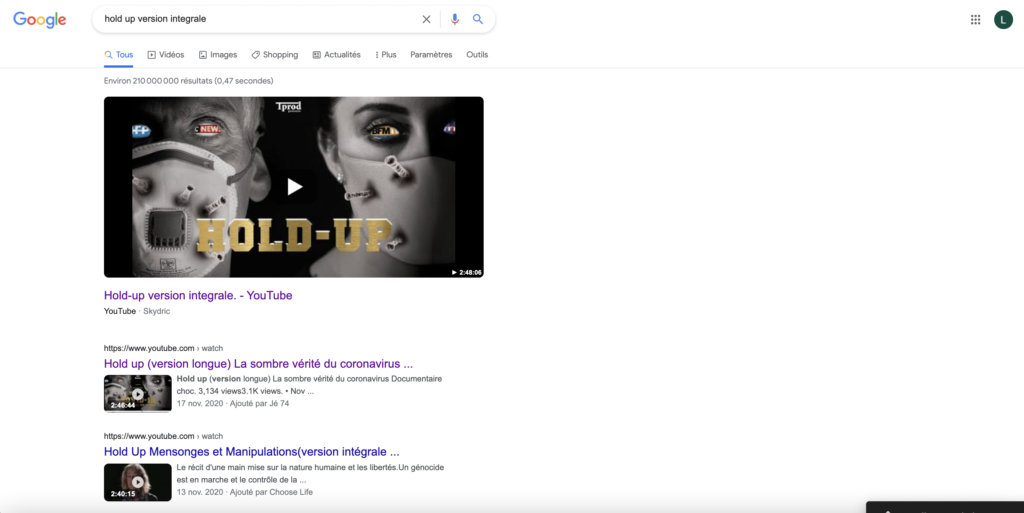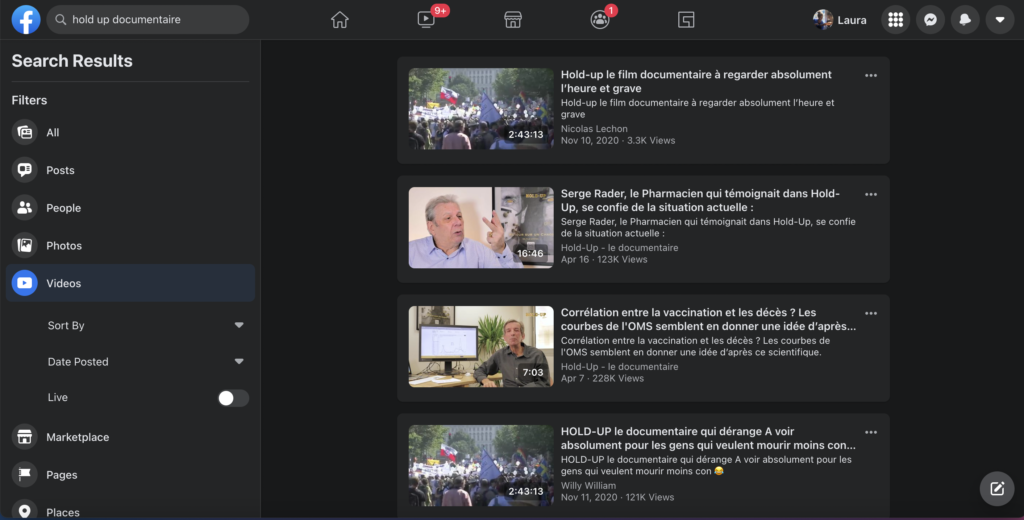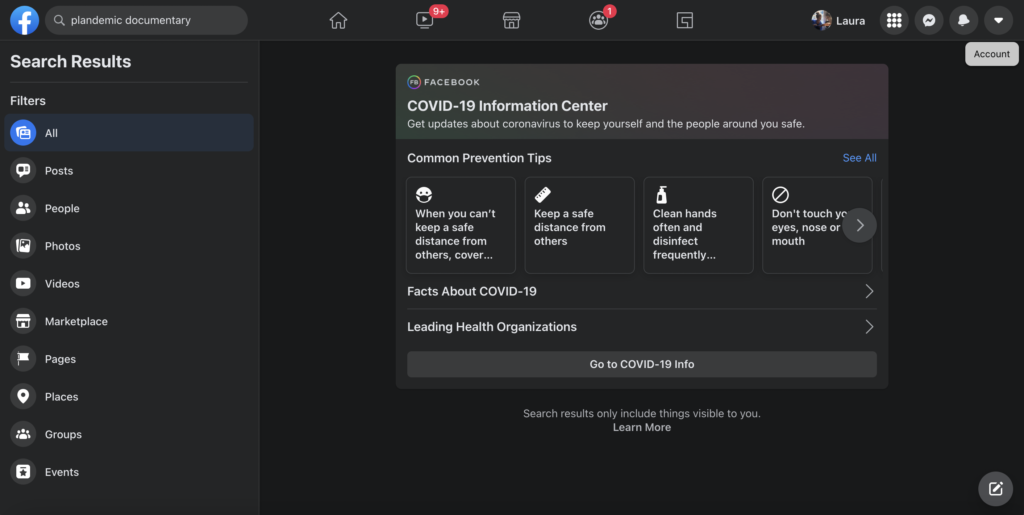A French coronavirus conspiracy video stayed on YouTube and Facebook for months
Press play to listen to this article
PARIS — Until very recently, a French COVID-19 conspiracy video called “Hold-up” was just a click away.
The film was still easily accessible online more than six months after its release in November last year, including on mainstream online platforms like Google’s YouTube and Facebook, according to a report by nonprofit EU DisinfoLab and additional research by POLITICO.
YouTube removed the videos after POLITICO flagged them ahead of publishing this story.
“Hold-up,” which presents itself as a well-researched documentary, claims the coronavirus pandemic is a secret plot by the global elite to eliminate a part of the world population and control the rest — a common belief among conspiracy theorists — and is similar to an American video, “Plandemic,” which also released last year.
But while Google and Facebook clamped down hard on Plandemic, its French counterpart could still be found online both in full and via extracts until May 10.
“YouTube acted quickly and aggressively to remove Plandemic; but in the case of Hold-up, YouTube’s inaction allowed the dissemination of conspiracy theories with serious harmful consequences for public health,” reads EU DisinfoLab’s report.
Since the pandemic began last year, online platforms have banned medical falsehoods, removed millions of pieces of COVID-19 disinformation and worked with national governments to promote trustworthy content. YouTube removed more than 900,000 videos related to dangerous or misleading COVID-19 medical information. Facebook removed more than 16 million pieces of content for violating its rules on COVID-19 and vaccine misinformation.
But a POLITICO review of Facebook posts, Twitter messages, YouTube channels and TikTok videos from March showed that coronavirus-related fake news is still rampant, even on mainstream platforms — highlighting the difficulties in fighting against increasingly sophisticated medical disinformation.
A dozen videos
“Hold-up” was released on November 11 last year, and reached nearly 3 million views five days later. It was first published behind a paywall on Vimeo and became even more viral after the platform banned it.
In 24 hours, it was uploaded on YouTube by 48 different accounts, according to France Inter, and links to the video were shared on other social media platforms such as Facebook and Twitter.
Traditional media outlets were quick to fact-check the film. AFP Factuel, the newswire’s fact-checking department, identified dozens of misleading or false comments, including on the origin of the virus, the danger of masks and hydroxychloroquine, a drug peddled by former U.S. President Donald Trump, as a cure for the disease. One of the people featured in the video — former Health Minister Philippe Douste-Blazy — dissociated himself from it, arguing he was “trapped” by the filmmakers.
Initially, YouTube did remove Hold-up videos, forcing uploaders to move to more fringe platforms like Odysee, a video-sharing platform popular among conspiracy theorists.
But research by EU DisinfoLab shows that, on May 6, at least 12 full versions of the video and numerous extracts were still online and easily searchable on the platform. One of them was the third result of a “Hold-up, full version” YouTube search. The full version videos that were still online until this week were uploaded six months ago and had gathered about 1.1 million views.
Web archives reviewed by EU DisinfoLab also showed that one of Hold-up’s full versions, which had generated about 2 million views, was still on the Google-owned platform until at least February — three months after the conspiracy documentary was released.
“To ensure the safety and security of our users, YouTube has clear policies which detail what content is allowed on the platform. As the COVID-19 situation has developed, we have continued to update our medical misinformation policies. We removed the video Hold Up because it now violates YouTube’s Medical Misinformation policy,” said a YouTube spokesperson.

‘Double standards’
In recent months, research has indicated that U.S. online platforms are putting in more effort to fight medical disinformation in their home country than elsewhere. An April report by campaign group Avaaz showed that disinformation and false statements about the coronavirus were twice as likely to stay up on Facebook if they were viewed in Europe compared to the U.S., where they were taken down more proactively.
“Hold-up is a francophone problem and, to American platforms under high pressure in the U.S., France is not a priority. France is the equivalent of a small American state,” said Tristan Mendès France, an associate lecturer at Université Paris-Diderot and specialist of conspiracy theories, who pointed out that Plandemic’s audience was significantly bigger because it’s in English.
On Google.fr, the first three search results for “Hold-up, version intégrale” until May 10 led to three YouTube videos of the documentary posted in November by three different accounts. A Google.com search for “Plandemic, full version” results in fact-checking and mainstream media clips about the U.S. conspiracy video.
On Facebook, a “Hold-up documentaire” search on May 10 led to several links to the video. By contrast, a “Plandemic documentary” search led to the platform’s COVID-19 information center. Users are redirected to the information center when they search for key words directly associated with vaccines or COVID-19, which is not the case for “Hold-up.”


“We are taking aggressive steps to fight harmful COVID-19 misinformation during the pandemic, including removing content like this video which breaks our rules,” said a spokesperson for Facebook.
To tackle the “double standard,” EU DisinfoLab recommends regulation that would ensure harmonized standards on disinformation and accountability from platforms, in all countries and languages. The EU’s proposed content moderation rules, known as the Digital Services Act, is “a step in this direction,” the group said.
“This raises a central question: Are the platforms’ terms of services universal, or do they differ depending on where you are?” said Alexandre Alaphilippe, EU DisinfoLab’s executive director.
“Europeans are becoming second-class users.”
Want more analysis from POLITICO? POLITICO Pro is our premium intelligence service for professionals. From financial services to trade, technology, cybersecurity and more, Pro delivers real time intelligence, deep insight and breaking scoops you need to keep one step ahead. Email [email protected] to request a complimentary trial.


